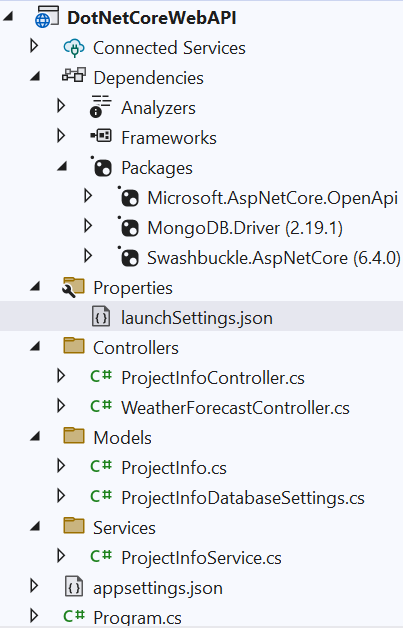We can see below service example step by step:
--Open Visual Studio 2022 & give the name as 'DotNetCoreWebAPI'
-I-Then create 'Models' folder>>ProjectInfo.cs add below code snippet
using MongoDB.Bson.Serialization.Attributes;
using MongoDB.Bson;
namespace DotNetCoreWebAPI.Models
{
public class ProjectInfo
{
[BsonId]
[BsonRepresentation(BsonType.ObjectId)]
public string? _id { get; set; }
public int ProjID { get; set; }
//[BsonElement("Name")]
public string ProjName { get; set; }
public string ProjType { get; set; }
public int __v { get; set; }
}
}
-II-Then create 'Models' folder>>ProjectInfoDatabaseSettings.cs add below code snippet
namespace DotNetCoreWebAPI.Models
{
public class ProjectInfoDatabaseSettings
{
public string ConnectionString { get; set; } = null!;
public string DatabaseName { get; set; } = null!;
public string ProjectInfoCollectionName { get; set; } = null!;
}
}
-III-Then create 'Services' folder>>ProjectInfoService.cs add below code snippet
using DotNetCoreWebAPI.Models;
using Microsoft.Extensions.Options;
using MongoDB.Driver;
namespace DotNetCoreWebAPI.Services
{
public class ProjectInfoService
{
private readonly IMongoCollection<ProjectInfo> _projectinfoCollection;
public ProjectInfoService(
IOptions<ProjectInfoDatabaseSettings> projinfoDatabaseSettings)
{
var mongoClient = new MongoClient(
projinfoDatabaseSettings.Value.ConnectionString);
var mongoDatabase = mongoClient.GetDatabase(
projinfoDatabaseSettings.Value.DatabaseName);
_projectinfoCollection = mongoDatabase.GetCollection<ProjectInfo>(
projinfoDatabaseSettings.Value.ProjectInfoCollectionName);
}
public async Task<List<ProjectInfo>> GetAsync() =>
await _projectinfoCollection.Find(_ => true).ToListAsync();
public async Task<ProjectInfo?> GetAsync(string id) =>
await _projectinfoCollection.Find(x => x._id == id).FirstOrDefaultAsync();
public async Task CreateAsync(ProjectInfo newProjectInfo) =>
await _projectinfoCollection.InsertOneAsync(newProjectInfo);
public async Task UpdateAsync(string id, ProjectInfo updatedProjectInfo) =>
await _projectinfoCollection.ReplaceOneAsync(x => x._id == id, updatedProjectInfo);
public async Task RemoveAsync(string id) =>
await _projectinfoCollection.DeleteOneAsync(x => x._id == id);
}
}
-IV-Then in 'appsettings.json' add below code snippet
{
"ABCBuildersDatabase": {
"ConnectionString": "mongodb://localhost:27017",
"DatabaseName": "ABCBuilders",
"ProjectInfoCollectionName": "ProjectInfo"
},
"Logging": {
"LogLevel": {
"Default": "Information",
"Microsoft.AspNetCore": "Warning"
}
},
"AllowedHosts": "*"
}
-V-Then in Controller folder>> 'ProjectInfoController.cs' add below code snippet
using DotNetCoreWebAPI.Models;
using DotNetCoreWebAPI.Services;
using Microsoft.AspNetCore.Mvc;
namespace DotNetCoreWebAPI.Controllers
{
[ApiController]
[Route("api/[controller]")]
public class ProjectInfoController : ControllerBase
{
private readonly ProjectInfoService _projinfoService;
public ProjectInfoController(ProjectInfoService piService) =>
_projinfoService = piService;
[HttpGet]
public async Task<List<ProjectInfo>> Get() =>
await _projinfoService.GetAsync();
[HttpGet("{id:length(24)}")]
public async Task<ActionResult<ProjectInfo>> Get(string id)
{
var projI = await _projinfoService.GetAsync(id);
if (projI is null)
{
return NotFound();
}
return projI;
}
[HttpPost]
public async Task<IActionResult> Post(ProjectInfo newProjectInfo)
{
await _projinfoService.CreateAsync(newProjectInfo);
return CreatedAtAction(nameof(Get), new { id = newProjectInfo._id }, newProjectInfo);
}
[HttpPut("{id:length(24)}")]
public async Task<IActionResult> Update(string id, ProjectInfo updatedProjectInfo)
{
var pi = await _projinfoService.GetAsync(id);
if (pi is null)
{
return NotFound();
}
updatedProjectInfo._id= pi._id;
await _projinfoService.UpdateAsync(id, updatedProjectInfo);
return NoContent();
}
[HttpDelete("{id:length(24)}")]
public async Task<IActionResult> Delete(string id)
{
var book = await _projinfoService.GetAsync(id);
if (book is null)
{
return NotFound();
}
await _projinfoService.RemoveAsync(id);
return NoContent();
}
}
}
-VI-Then at last configure services in 'Program.cs' file
using DotNetCoreWebAPI.Models;
using DotNetCoreWebAPI.Services;
var builder = WebApplication.CreateBuilder(args);
// Add services to the container.
builder.Services.Configure<ProjectInfoDatabaseSettings>(
builder.Configuration.GetSection("ABCBuildersDatabase"));
builder.Services.AddSingleton<ProjectInfoService>();
builder.Services.AddControllers();
// Learn more about configuring Swagger/OpenAPI at https://aka.ms/aspnetcore/swashbuckle
builder.Services.AddEndpointsApiExplorer();
builder.Services.AddSwaggerGen();
var app = builder.Build();
// Configure the HTTP request pipeline.
if (app.Environment.IsDevelopment())
{
app.UseSwagger();
app.UseSwaggerUI();
}
app.UseHttpsRedirection();
app.UseAuthorization();
app.MapControllers();
app.Run();
--Then Build and Run the application to check the services using Swagger as well as in Postman



No comments:
Post a Comment